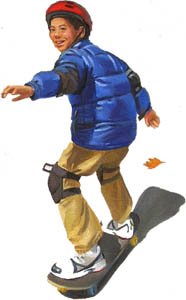 Paula Yoo is a children’s book writer, television writer, and freelance violinist living in
Paula Yoo is a children’s book writer, television writer, and freelance violinist living in![]() Los Angeles. Her latest book, Twenty-two Cents: Muhammad Yunus and the Village Bank, was released last month. Twenty-two Cents is about Muhammad Yunus, Nobel Peace Prize winner and founder of Grameen Bank. He founded Grameen Bank so people could borrow small amounts of money to start a job, and then pay back the bank without exorbitant interest charges. Over the next few years, Muhammad’s compassion and determination changed the lives of millions of people by loaning the equivalent of more than ten billion US dollars in micro-credit. This has also served to advocate and empower the poor, especially women, who often have limited options. In this post, we asked her to share advice on what’s she’s learned about banking, loans, and managing finances while writing Twenty-two Cents.
Los Angeles. Her latest book, Twenty-two Cents: Muhammad Yunus and the Village Bank, was released last month. Twenty-two Cents is about Muhammad Yunus, Nobel Peace Prize winner and founder of Grameen Bank. He founded Grameen Bank so people could borrow small amounts of money to start a job, and then pay back the bank without exorbitant interest charges. Over the next few years, Muhammad’s compassion and determination changed the lives of millions of people by loaning the equivalent of more than ten billion US dollars in micro-credit. This has also served to advocate and empower the poor, especially women, who often have limited options. In this post, we asked her to share advice on what’s she’s learned about banking, loans, and managing finances while writing Twenty-two Cents.
What are some reasons why someone might want to take out a loan? Why wouldn’t banks loan money to poor people in Bangladesh?
PAULA: People will take out a loan when they do not have enough money in their bank account to pay for a major purchase, like a car or a house. Sometimes, they will take out a loan because they need the money to help set up a business they are starting. Other times, loans are also used to help pay for major expenses, like unexpected hospital bills for a family member who is sick or big repairs on a house or car. But asking for a loan is a very complicated process because a person has to prove they can pay the loan back in a reasonable amount of time. A person’s financial history can affect whether or not they are approved for a loan. For many people who live below the poverty line, they are at a disadvantage because their financial history is very spotty. Banks may not trust them to pay the loan back on time.


 Educational reforms since the 1960s have led to the development of formal content standards in economics and the infusion of economics as a central component of social studies curricula in every grade level. Because of the standards movement, even elementary school teachers face considerable pressure to teach economic content that is based on state requirements and is often linked to school accreditation and funding. Increasingly crowded curricula are a common issue, and many teachers feel they are too busy to teach economics. As almost all states have added economics to their state-mandated curricula in the primary grades, teaching strategies have needed to change.
Educational reforms since the 1960s have led to the development of formal content standards in economics and the infusion of economics as a central component of social studies curricula in every grade level. Because of the standards movement, even elementary school teachers face considerable pressure to teach economic content that is based on state requirements and is often linked to school accreditation and funding. Increasingly crowded curricula are a common issue, and many teachers feel they are too busy to teach economics. As almost all states have added economics to their state-mandated curricula in the primary grades, teaching strategies have needed to change.